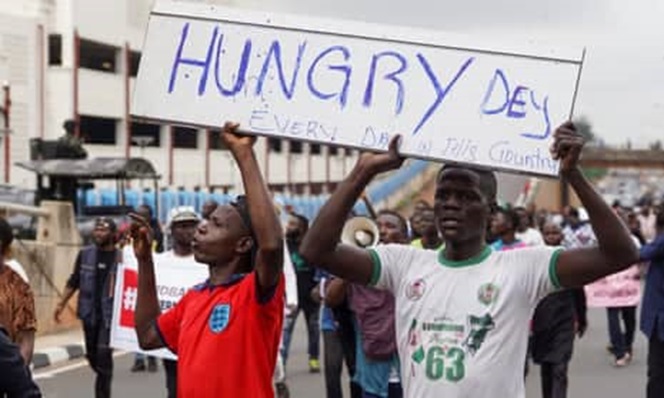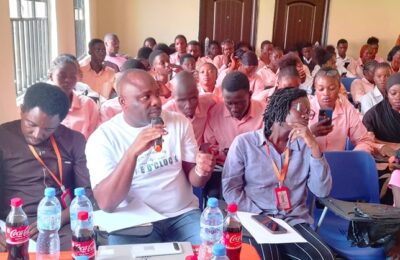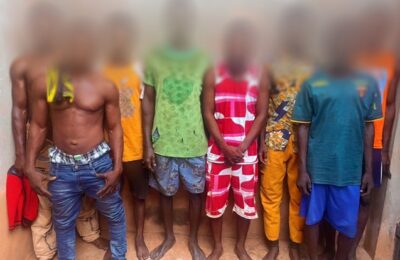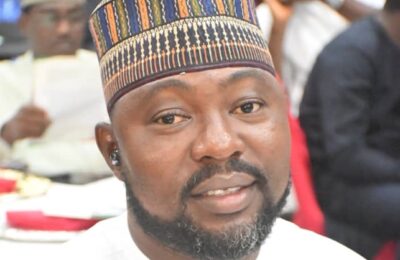By Abdul Aji.
On Thursday, August 1, 2024, Nigeria experienced a new wave of nationwide protests, as citizens expressed their mounting anger and frustration. The underlying issues prompting these demonstrations are complex and varied, encompassing economic difficulties, rampant government corruption, and perceived failures in leadership. The pervasive corruption at multiple levels of government has significantly diminished public trust, leading to a growing disillusionment among Nigerians who feel that their leaders prioritize personal gain over the welfare of the populace.
President Bola Tinubu’s administration, which took office on May 29, 2023, was initially met with high hopes for reform and relief from the burdens imposed by the previous government of Major-General Muhammadu Buhari (retd.). However, the President’s early decisions, particularly the abrupt removal of petrol subsidies, have intensified the economic strain on citizens, resulting in soaring prices for essential goods and services. This has left many individuals struggling to survive, further igniting widespread dissatisfaction.
The current protests are not solely a response to immediate economic challenges; they also represent a culmination of long-standing grievances. Issues such as police brutality, insufficient public services, and deteriorating infrastructure have been festering for years. Movements like #EndSARS, which arose in 2020 to address police violence, underscore the ongoing demand for justice and systemic reform within the country.
Protests have historically played a crucial role in Nigeria, mirroring the nation’s diverse social, political, and economic struggles. From the Aba Women’s Riot in 1929 to the Naira Redesign protests in 2023, the resilience of Nigerians in the face of adversity is evident, as is their steadfast commitment to fighting for their rights and striving for a brighter future.
The Aba Women’s Riot, which occurred in December 1929, marked a significant uprising by women in southeastern Nigeria against the oppressive British colonial regime. These women voiced their dissent against the imposition of taxes and the harsh policies enforced by the colonial authorities. Tragically, the revolt resulted in the deaths of approximately 50 women, with many others suffering from assaults during the protests.
In November 1947, the Abeokuta Women’s Revolt emerged as another pivotal demonstration by women in what is now Ogun State’s capital, targeting both colonial powers and local leaders, primarily in response to unjust taxation. This movement was notably spearheaded by women, including the prominent Funmilayo Ransome-Kuti, who was the mother of the renowned musician Fela Anikulapo-Kuti.
The youth of Nigeria took a stand in April 1978, initiating the ‘Ali Must Go’ nationwide protest against a tuition hike attributed to the then-Minister of Education, Colonel Ahmadu Ali. University students rallied against this increase, which they believed was imposed by Ali, leading to widespread demonstrations and clashes with security forces. Although Ali, who had served under three successive Heads of State—Yakubu Gowon, Murtala Mohammed, and Olusegun Obasanjo—was seen as a central figure in the unrest, he attempted to deflect blame by claiming that the decision was made by the Supreme Military Council rather than his ministry.
Dr. Jibril Aminu, the Secretary of the Nigerian University Commission at the time, announced that the rising cost of living necessitated an increase in school fees for tertiary institutions. The hostel fee was raised to N90 per student for a 36-week session, while meal ticket prices surged from N1.50 to N2.00. Segun Okeowo, a former President of the National Union of Nigerian Students, led a series of protests in response. On the second day of demonstrations, a violent confrontation occurred between students and the Nigerian Police at the University of Lagos, resulting in a student being shot in the leg and subsequently bleeding to death. The protests escalated, leading to the tragic deaths of about eight students in Zaria at the hands of soldiers, ultimately resulting in the closure of the university.
On May 24, 1989, demonstrations erupted in response to the Structural Adjustment Programme instituted by the administration of Ibrahim Babangida. These protests drew participation from a diverse group, including students, labor unions, the unemployed, and even individuals engaged in criminal activities. The SAP, mandated by the International Monetary Fund, was introduced as a governmental strategy in 1986 to mitigate the adverse effects of declining oil prices and to promote the growth of local industries. This policy was essential for Nigeria to qualify for loans from the IMF. As the transportation system deteriorated, citizens found themselves leaving home earlier than usual for their daily journeys and often subsisting on just one meal a day.
As the economic difficulties intensified, the Nigerian National Petroleum Corporation announced a price increase of N2.50 for petroleum products, which subsequently led to a rise in food and transportation costs. The initial unrest was sparked by students but quickly expanded beyond the university environment, resulting in widespread damage to state-owned properties. In response to the protests, a relief package aimed at alleviating the burdens of the SAP was developed and successfully mitigated the unrest. This package included the creation of 62,000 jobs, with unemployed graduates directed to ministries for immediate employment, alongside funding allocated for hiring teachers. Additionally, programs were established to provide food for the impoverished and transport relief. Import duties on vehicles and spare parts were eliminated following the riots, and students received N500 bursaries to help them cope with the economic strain. It is estimated that approximately $1 billion was allocated to these SAP relief initiatives.
In 1993, widespread protests erupted once more across Nigeria in the wake of the annulment of the presidential election by the Babangida administration. This election, held on June 12, 1993, marked the first since the military coup of 1983, which had brought an end to the Second Republic. Although the National Electoral Commission did not officially declare the results, unofficial counts indicated a clear winner.

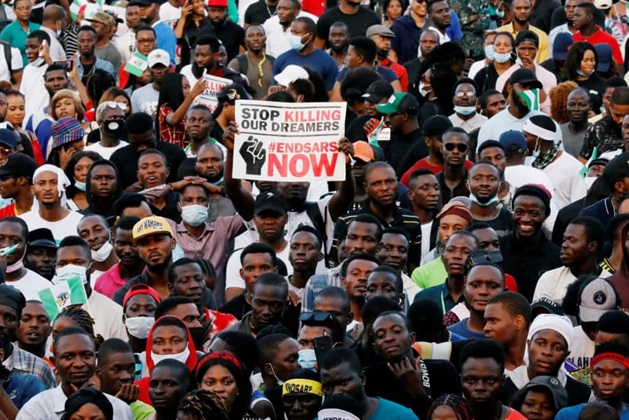
On January 2, 2012, a new wave of protests emerged, known as ‘Occupy Nigeria.’ This socio-political movement was ignited on that Monday in response to the Federal Government’s abrupt removal of the fuel subsidy, a decision made by then-President Goodluck Jonathan on January 1, 2012. The announcement regarding the subsidy removal was made without prior notice, prompting the organizers of Occupy Nigeria to mobilize the public the very next day. The decision, spearheaded by Finance Minister Ngozi Okonjo-Iweala, caught citizens off guard, as the government maintained that eliminating the substantial subsidy would allocate funds for essential public services, such as healthcare and infrastructure, while also asserting that deregulating the fuel sector would enhance economic conditions.
Following this policy change, the price of petrol surged from N65 per litre to N141, leading to a swift increase in consumer prices, with bus fares and food costs doubling in some instances. Protests erupted in major cities including Lagos, Abuja, and Kano on January 2, and by January 6, demonstrations had spread nationwide, effectively halting economic activities in cities like Lagos, Ibadan, and Kano. The protests were spearheaded by prominent Nigerians and human rights advocates, including members of opposition parties, notably led by current President Bola Tinubu. In a notable turn of events, some police officers even joined the demonstrators in Lagos. The Nigeria Labour Congress and the Trade Union Congress announced a national strike set to commence on January 9, receiving backing from the Nigerian Medical Association, the Nigerian Bar Association, and various other unions. By the time the general strike began on January 9, oil and gas workers had also joined the movement, although the protests had already resulted in the deaths of 11 individuals at the hands of security forces. In response to the escalating unrest, President Jonathan sought to mitigate the situation by establishing a panel to oversee the allocation of funds released from the subsidy removal, while also announcing a 25 percent reduction in fuel prices.
The EndSARS protest that took place in October 2020 is still vividly remembered as a significant movement against police brutality, particularly aimed at the Special Anti-Robbery Squad (SARS). This protest evolved into a larger campaign addressing systemic corruption and poor governance in Nigeria.
The nationwide demonstrations commenced on Thursday, October 8, 2020, following weeks of public outrage fueled by disturbing videos and images depicting police violence, harassment, and extortion. Predominantly led by young Nigerians across various cities, the protests also saw participation from numerous activists and celebrities. The hashtag #EndSARS garnered over 28 million tweets on Twitter (now X), and solidarity protests emerged globally, with Nigerians in the diaspora and supporters rallying in major cities worldwide. On October 11, 2020, the Nigeria Police Force announced the immediate dissolution of the SARS unit, a decision that was largely viewed as a victory for the protesters. However, skepticism remained, as similar promises had been made in the past without genuine action, leading many to believe that the government intended merely to reassign SARS officers rather than fully disband the unit.
Consequently, protests persisted, met with violent repression from the Nigerian government, including the tragic killing of demonstrators, which prompted international solidarity demonstrations and increasing criticism of President Muhammadu Buhari’s administration. On Sunday, October 11, 2020, the protesters articulated five key demands directed at the Federal Government, which were endorsed by a group known as ‘A Nigerian Youth.’ These demands included the immediate release of all individuals arrested during the protests, justice and compensation for victims of police brutality, and the establishment of an independent body within ten days to investigate and prosecute all allegations of police misconduct.
In light of the public outcry, the Inspector-General of the Nigeria Police has prohibited the FSARS, Special Tactical Squad, Intelligence Response Team, Anti-Cultism Squad, and other tactical units from conducting roadblocks, checkpoints, stop-and-search operations, and other routine patrols. On October 19, 2020, President Muhammadu Buhari addressed the ongoing protests, cautioning young Nigerians about alleged anarchists attempting to exploit the situation, asserting that the Federal Government would not permit any form of anarchy within the nation. The following day, October 20, 2020, the Central Bank of Nigeria, led by Governor Godwin Emefiele, secured an ex parte motion to freeze the accounts of prominent figures involved in the End SARS protests.
By the evening of that same day, a video recorded by DJ Switch depicting the shooting of Nigerian youths at Lekki Toll Gate circulated widely online, illustrating how live ammunition was fired at peaceful protesters who were huddled together, singing the National Anthem. Reports indicated that at least 50 individuals sustained injuries, which incited further outrage and escalated the protests the next day. Lagos experienced significant turmoil, with numerous BRT buses set ablaze, the Igbosere court destroyed, and media establishments such as TVC and the Nation headquarters also targeted by the mob. Similar to the economic hardships faced in 2012 following the removal of fuel subsidies, Nigerians expressed their grievances regarding the adverse effects on their livelihoods, leading them to organize a protest against poor governance and economic mismanagement scheduled for August 1. In anticipation of the protest, the police, via their X handle @PoliceNG, issued a message on Wednesday stating, “Hello, good morning! It’s the last day of the month of July. We hope for a more fulfilling August. And…if you must protest, do so peacefully. Be watchful and vigilant. Our history is littered with ugly experiences of protests that turned violent. We certainly can’t have a repeat. Not at these fragile moments!”
On the first day of the protest, following the Federal Executive Council meeting, the Federal Government revealed a significant reduction in the price of a 50kg bag of rice, which had previously been priced at N80,000, now available for N40,000 at selected centers nationwide. During the same meeting, the President alleviated concerns regarding the Dangote Refinery by instructing the Nigerian National Petroleum Company Limited to sell crude oil to the refinery and other domestic refineries in naira.
Additionally, the President enacted the New National Minimum Wage Bill, which mandates a payment of N70,000 to Nigerian workers starting in May, with a commitment to settle any outstanding payments from May to July, allowing workers to benefit from the increased wages in their August salaries.
The subsequent day saw the Comptroller-General of Customs announce that the government had authorized a 150-day waiver for the importation of food items, a move aimed at bolstering food security in the country. Consequently, the government suspended import duties on food and various other commodities. Furthermore, Senate President Godswill Akpabio declared that the Federal Government would provide a monthly stipend of N50,000 to 10,000 youths from the Niger Delta region through the Youth Internship Scheme. In addition, the Nigerian Educational Loan Fund reported that it had covered the institutional fees for 20,000 students enrolled in registered institutions across the nation, and on Wednesday, the Fund disclosed the allocation of an extra N850 million to assist more students who had applied for loans.
The actions undertaken by the Nigerian government to avert the anticipated “End Bad Governance Protests” illustrate a comprehensive strategy designed to tackle economic, social, and political issues.
These initiatives highlight the government’s dedication to fostering peace and stability while striving to enhance the living standards of its populace. However, the true effectiveness of these measures in curbing the protests and achieving enduring stability will only become apparent over time.
The protests inflicted an estimated daily loss of N400bn, with severe consequences for the country and its citizens. The protests, organised by various groups in the country, was aimed at drawing attention to the country’s economic woes, including high inflation, production costs, unemployment and hunger; However, economic experts said the protests lead to shutdowns and disruptions in major sectors of the economy, including trade and commerce, manufacturing, and financial services.
There was shutdowns and disruptions in major sectors of the economy. This is in addition to risks to lives and properties of innocent citizens and corporate bodies. The protests created opportunities for hoodlums, miscreants, and other criminal elements in the society to build momentum to unleash mayhem and destruction on the country, especially in the north.

